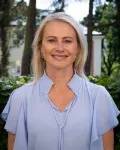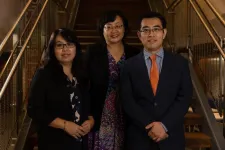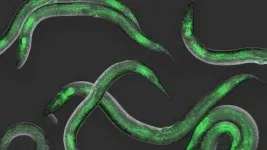(Press-News.org) One radiologist supported by AI detected more cases of breast cancer in screening mammography than two radiologists working together, reports the ScreenTrustCAD study from Karolinska Institutet in The Lancet Digital Health. The researchers say that AI is now ready to be implemented in breast cancer screening.
For over 30 years, screening mammography has been an important key in reducing breast cancer mortality rates. However, challenges include a lack of radiologists and that not all cancers are detected. Several retrospective studies have shown that artificial intelligence could help address these problems.
“AI and humans perceive images slightly differently, which creates a synergy that improves our chances of detecting cancer,” says first author Karin Dembrower, affiliated researcher at the Department of Oncology-Pathology, Karolinska Institutet.
Traditionally, two radiologists read every exam. In the present study, exams were assessed by two radiologists and AI in order to decide which women were to be recalled for further investigation. Based on which women were diagnosed with breast cancer in the end, the researchers could determine how accurate different combinations of AI and radiologists were compared to the traditional two-radiologist approach.
“With the ScreenTrustCAD study, we wanted to examine how well two radiologists performed compared with one radiologist and AI, and AI alone,” says Dr Dembrower.
The study was conducted at Capio St Göran’s Hospital in Stockholm between April 2021 and June 2022. Over 55,500 women between the ages of 40 and 74 were screened.
The traditional approach using two radiologists detected 250 cancers. Not unexpectedly, the researchers found that adding AI to two radiologists detected most cases of cancer – 269. One radiologist and AI detected 261 in the same cohort. AI alone detected 246, which was statistically non-inferior to two radiologists.
“Compared with the current two-radiologist standard, assessment by one radiologist and AI resulted in a four per cent increase in breast cancer detection and halved the radiologists’ image reading time,” says principal investigator Fredrik Strand, radiologist and docent at the Department of Oncology-Pathology, Karolinska Institutet.
The researchers also found that compared with two radiologists, one radiologist plus AI and AI alone led, respectively, to a six and 55 per cent reduction in false positives – which is to say the recall rate for healthy women, a procedural error that causes unnecessary suffering and cost.
“It’s clear to us that for screening mammography, one AI-supported radiologist is a better alternative than two radiologists without AI,” says Dr Strand. “Unlike a previous study from Lund University, this improvement is statistically validated in ScreenTrustCAD. Even if AI takes over much of the initial examination, a radiologist is needed to make the judgment before any patient is recalled for further investigation, and, if necessary, to take biopsies from suspicious breast areas.”
He continues: “Our study shows that AI is ready for controlled implementation in screening mammography. However, you must choose an AI system that has been properly tested on images from the same type of mammography equipment and ensure continuous monitoring after clinical implementation. In the longer term, AI has the potential to take over the majority of screening mammography assessments.”
Screening mammograms have been assessed at Capio St Göran’s Hospital by an AI-supported radiologist since June 2023, which has freed up time for the radiologists to devote to breast cancer patients. The study was financed by the Swedish Research Council, Region Stockholm, the Swedish Cancer Society, and software developer Lunit Inc.
Publication: “Artificial intelligence for breast cancer detection in screening mammography: A paired-readers prospective interventional screen positive trial”, Karin Dembrower, Alessio Crippa, Eugenia Colón, Martin Eklund, Fredrik Strand, The Lancet Digital Health, online 8 september 2023, doi: 10.1016/S2589-7500(23)00153-X
END
More cases of breast cancer detected with the help of AI
2023-09-09
ELSE PRESS RELEASES FROM THIS DATE:
Mayo Clinic study reveals proton beam therapy may shorten breast cancer treatment
2023-09-09
ROCHESTER, Minn. — In a randomized trial, published in The Lancet Oncology, Mayo Clinic Comprehensive Cancer Center researchers uncover evidence supporting a shorter treatment time for breast cancer patients. The study compared two separate dosing schedules of pencil-beam scanning proton therapy, the most advanced type of proton therapy known for its precision in targeting cancer cells while preserving healthy tissue to reduce the risk of side effects.
Survival rates for breast cancer continue to improve due to advances in diagnosis and treatment, leading to increasing emphasis on reducing the long-term ...
Study reveals human destruction of global floodplains
2023-09-09
A University of Texas at Arlington hydrologist’s study in the Nature journal Scientific Data provides the first-ever global estimate of human destruction of natural floodplains. The study can help guide future development in a way that can restore and conserve vital floodplain habitats that are critical to wildlife, water quality and reducing flood risk for people.
Adnan Rajib, a UT Arlington assistant professor in the Department of Civil Engineering, was the lead author on the published study, “Human Alterations of the Global Floodplains.” His doctoral student, Qianjin Zheng, played a significant ...
MSU research shows table salt could be the secret ingredient for better chemical recycling
2023-09-08
Images
Researchers at Michigan State University have shown that table salt outperforms other expensive catalysts being explored for the chemical recycling of polyolefin polymers, which account for 60% of plastic waste.
The research, published in the journal Advanced Sustainable Systems, shows that sodium chloride could provide a safe, inexpensive and reusable way to make plastics more recyclable.
The team also showed that table salt and other catalysts could be used in the recycling of metallized plastic films — like ...
RESEARCH ALERT: City of Hope scientists identify new therapeutic target for metastatic cancer
2023-09-08
FINDINGS
In a recent study led by Lei Jiang, Ph.D., an assistant professor of molecular and cellular endocrinology, a team of researchers from City of Hope and the University of Texas Southwestern Medical Center, found a potential new target for treating patients with metastatic cancer. Their findings were published in the August 29 issue of the journal Cell Reports.
The goal of the team’s study was to elucidate the role of reductive carboxylation in redox metabolism, a process believed to be important for metastatic cancer. Reductive carboxylation is best known as a metabolic pathway that provides a molecule called acetyl-CoA so that it can be turned into lipids, which ...
McWilliams School of Biomedical Informatics researchers awarded $3.4M NIH grant to understand link between chronic health conditions and Alzheimer's disease
2023-09-08
A three-year, $3.4 million grant to investigate how Alzheimer’s disease is connected to multiple chronic diseases has been awarded to UTHealth Houston researchers by the National Institute on Aging, part of the National Institutes of Health.
To study this, a team led by Xiaoqian Jiang, PhD, principal investigator and professor and chair in the Department of Health Data Science and Artificial Intelligence with McWilliams School of Biomedical Informatics at UTHealth Houston, will build risk trajectory maps for patients using clinical data and electronic health records. Specifically, they will develop electronic health records ...
SwiftPharma and the Population Council pursue agreement to manufacture Griffithsin needed for the development of a fast-dissolving insert for protection against HIV
2023-09-08
September 8, 2023 – SwiftPharma, a Belgium-based manufacturer, and the Population Council, a global nonprofit research organization, have signed a Manufacturing Master Service Agreement for the plant-based manufacture of Griffithsin to further the Council’s development of a Griffithsin fast-dissolving vaginal insert for protection against HIV.
The Population Council has been developing a non-antiretroviral HIV-prevention method containing Griffithsin (GRFT) in a fast-dissolving insert (FDI). This Griffithsin FDI is an on-demand, user-controlled, portable prevention technology in early development ...
What defines a safety-net hospital?
2023-09-08
Safety-net hospitals have a common mission to provide care for Medicaid beneficiaries and those who are uninsured, but there’s no universal definition for these hospitals—complicating efforts to allocate funding.
In a new analysis published in JAMA Network Open and led by researchers at the NYU School of Global Public Health, the research team looked at five established definitions for safety-net hospitals and found that different criteria captured varying hospitals and characteristics. As a result, when the Centers for Medicaid and Medicare Services (CMS) use one definition ...
Heatwaves hitting Antarctica too
2023-09-08
The world saw another year full of extreme weather events resulting from climate change in 2022, from intense storms to soaring temperatures and rising sea levels. Antarctica was no exception, according to new research published this week.
In the 33rd annual State of the Climate report, an international assessment of the global climate published Sept. 6 in the Bulletin of the American Meteorological Society, CU Boulder researchers report that the planet’s coldest and driest continent experienced both an unprecedented heatwave and extreme precipitation last year.
“My hope is that the public starts to see both the fragility and complexity of these ...
These worms have rhythm
2023-09-08
There’s a rhythm to developing life. Growing from a tiny cell cluster into an adult organism takes precise timing and control. The right genes must turn on at the right time, for the right duration, and in the correct order. Losing the rhythm can lead to diseases like cancer. So, what keeps every gene on beat?
Cold Spring Harbor Laboratory (CSHL) Professor Christopher Hammell has found that in the worm C. elegans, this genetic orchestra has no single conductor. Instead, a quartet of molecules works in concert to time each developmental stage. Hammell says this process shares some similarities with the circadian clocks that control human ...
Sleep-wake therapy gives new hope for teens with depression
2023-09-08
Sleep-Wake Therapy Gives New Hope for Teens with Depression
Promoting healthy sleep in teen night owls brings adolescents’ biology and school demands in alignment.
School systems aren’t built for kids who fall asleep and wake up late, the so-called “night owls,” which may help explain why this group of teens is more prone to depression.
Now, researchers at UC San Francisco have found a way to help these kids adjust to their natural sleep-cycle rhythms while still fulfilling their school responsibilities. The findings are a welcome sign for adolescents with ...





